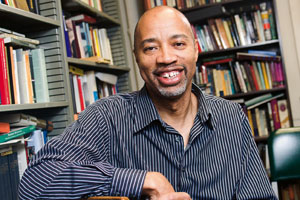Kenneth Warren, the William J. Friedman & Alicia Townsend Friedman Professor in English Language & Literature
By Jennifer CarnigNews Office
 Holly Swyers | |
Kenneth Warren never wanted to be a teacher.“I didn’t enter this profession because I saw myself as a teacher,” says Warren, the William J. Friedman & Alicia Townsend Friedman Professor in English Language & Literature. “I was compelled by the opportunity to read and write about literature. That’s why winning the Quantrell Award is so flattering—and so surprising.”
Though he admits teaching was a requirement he had to fulfill, Warren says he now finds the time he spends in the classroom or one-on-one with students among the most rewarding parts of his day. Not only does he love the look of animation in a student’s eye when he or she becomes excited about a book or idea, but Warren appreciates how he grows intellectually from the interactions as well.
“You can’t do successful work as a scholar without the input and challenges you get teaching,” Warren says.
But how does someone uninterested in teaching with no background in it become a teacher? Warren answers that question with a smile. “If teaching is an art,” he says, “it’s one that I haven’t mastered.”
His insecurity may be one of the elements that make Warren so good at what he does. Each time he is about to teach a course, Warren pretends it is his first time ever standing in front of a class. “I’m always re-teaching myself how to teach. It’s a constant quest to figure out how to interest students in what it is that you’re doing, and then to convey the cutting edge of what you’re doing to people who aren’t fully versed in it.”
Warren, who earned his A.B. in history and literature from Harvard University and his Ph.D. in English and American literature from Stanford University, joined the Chicago faculty in 1991. His scholarship and teaching focus on American and African-American literature from the late-19th century through the mid-20th century. He is especially interested in how various understandings of black/white racial differences have affected, and continue to affect, the way American authors write about and pass critical judgment on American literature.
In deciding what to teach, then, Warren says he does not think about specific pieces of literature so much as he thinks about questions that interest him: What is the relationship between literature and history or literature and politics? He wants to know if literature offers a distinctive approach to the human experience.
The courses Warren teaches reflect those questions as well as his interest in genre, the politics of race and the relation of culture to politics. The American Novel and the Death of Jim Crow, the class he most recently taught, asked students to consider the role played by some of the major novels of the late 1940s and the 1950s in undermining the nation’s commitment to racial segregation.
The class was framed around two central questions: Did the novelist feel pressure during the period of Brown vs. the Board of Education through the Voting Rights Act to address issues of civil rights, and did writers contribute to the discussion of race in America? Rather than give the answers, Warren tried to recreate the debates of the day and get students to imagine how readers interpreted and responded to the works when they were first written.
“I want the student to be able to see what the animating issues are,” he says, “what the issues are that I am struggling over.”
At Chicago, Warren says, he has been able to find the perfect conversation partners.
“Being at the University has been a major boost for me in learning how to teach,” he says. “Students here want to take you on and really dig into what you’re doing. The kind of give-and-take model I’ve adopted works well when you have students who want to give as much as they take. They’ve made me a better teacher and a better scholar.”
![[Chronicle]](/images/sidebar_header_oct06.gif)